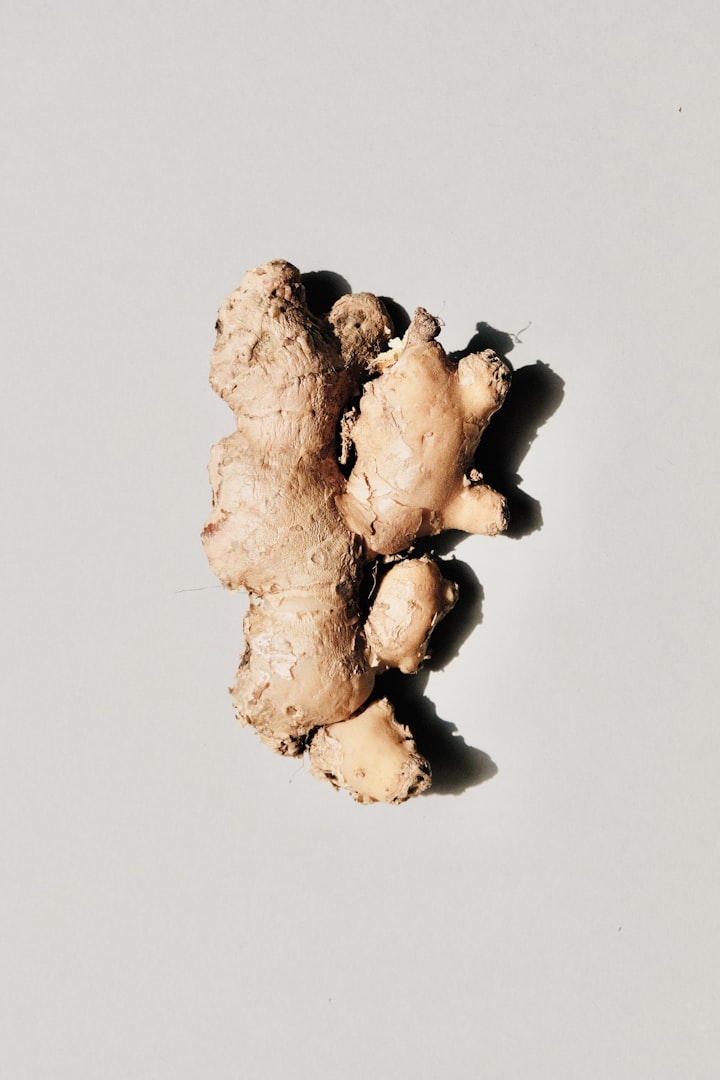
Ginger is a flowering plant that belongs to the Zingiberaceae family, which also includes turmeric, cardamom, and galangal. The plant is native to Southeast Asia, but it is now widely cultivated in other parts of the world, including South Asia, Africa, the Caribbean, and South America. Ginger has been used for its medicinal and culinary properties for thousands of years, and it is still a popular ingredient in many cuisines.
The ginger plant has a long, slender stem that grows underground, called a rhizome. The rhizome is the part of the plant that is most commonly used for medicinal and culinary purposes. It has a pungent, spicy flavor and aroma that is caused by the presence of gingerols and shogaols, which are the main bioactive compounds in ginger.
Ginger has a long history of use in traditional medicine. It has been used to treat a variety of ailments, including nausea, vomiting, colds, and menstrual cramps. Ginger has also been used as an anti-inflammatory agent and as a pain reliever. Modern research has confirmed many of these traditional uses of ginger, and studies have shown that ginger can be an effective treatment for several health conditions.
One of the most well-known uses of ginger is as a treatment for nausea and vomiting. Ginger has been shown to be effective in reducing nausea caused by motion sickness, morning sickness during pregnancy, and chemotherapy. Ginger can also help to reduce inflammation in the body, which makes it a useful treatment for conditions such as osteoarthritis and rheumatoid arthritis.
Ginger is also a rich source of antioxidants, which are compounds that protect the body against damage from free radicals. Free radicals are unstable molecules that can damage cells and contribute to the development of chronic diseases, such as cancer and heart disease. The antioxidants in ginger can help to neutralize free radicals and protect against these diseases.
In addition to its medicinal properties, ginger is a popular culinary ingredient. It is used in many cuisines around the world, including Indian, Chinese, and Thai cuisine. Ginger can be used fresh, dried, or in powdered form, and it can be added to dishes such as soups, stews, curries, and stir-fries. It is also a common ingredient in baked goods such as gingerbread and ginger snaps.
In summary, ginger is a versatile and flavorful plant with many health benefits. It has been used for thousands of years in traditional medicine and is still a popular remedy for nausea, inflammation, and pain. Ginger is also a rich source of antioxidants and is a popular culinary ingredient.
Ginger is a flowering plant that has been used for medicinal purposes for thousands of years. Its root, or rhizome, is commonly used as a spice in cooking and as a natural remedy for various ailments. Ginger is packed with nutrients and bioactive compounds that have numerous health benefits.
Reduces Inflammation
Inflammation is a natural response of the body to injury or infection. However, chronic inflammation can lead to several chronic diseases such as heart disease, cancer, and diabetes. Ginger has anti-inflammatory properties that help reduce inflammation in the body. Its compounds, such as gingerols and shogaols, inhibit the production of pro-inflammatory cytokines that are responsible for causing inflammation.
Relieves Nausea and Vomiting
Ginger has been used for centuries to relieve nausea and vomiting caused by motion sickness, morning sickness during pregnancy, and chemotherapy. Its compounds, particularly gingerols and shogaols, act on the digestive system and help reduce the symptoms of nausea and vomiting.
Reduces Muscle Pain and Soreness
Ginger has analgesic properties that help reduce muscle pain and soreness. Its compounds, such as gingerols and zingerones, have anti-inflammatory effects that help reduce the inflammation and pain in the muscles after exercise.
Lowers Blood Sugar Levels
Ginger has been found to lower blood sugar levels in people with type 2 diabetes. Its compounds, particularly gingerols, enhance insulin sensitivity and increase glucose uptake in the cells, which helps lower blood sugar levels.
Improves Heart Health
Ginger has been found to improve heart health by reducing blood pressure and cholesterol levels. Its compounds, such as gingerols and shogaols, help dilate blood vessels and improve blood flow, which helps reduce blood pressure. Ginger also helps lower LDL (bad) cholesterol levels, which can help reduce the risk of heart disease.
Boosts Immune System
Ginger has immune-boosting properties that help improve the body's defense against infections and diseases. Its compounds, such as gingerols and zingerones, have antioxidant properties that help protect the body from free radicals and oxidative stress. Ginger also helps stimulate the production of white blood cells, which play a vital role in fighting infections.
Relieves Menstrual Pain
Ginger has been found to relieve menstrual pain in women. Its compounds, particularly gingerols, act as natural painkillers and help reduce the severity of menstrual cramps.
Improves Brain Function
Ginger has been found to improve brain function by enhancing cognitive performance and reducing the risk of age-related cognitive decline. Its compounds, such as gingerols and shogaols, have antioxidant and anti-inflammatory properties that help protect the brain from oxidative stress and inflammation.
Helps Digestion
Ginger has been used for centuries to aid digestion and relieve digestive issues such as bloating, gas, and constipation. Its compounds, such as gingerols and shogaols, act on the digestive system and help improve digestion by increasing the production of digestive enzymes and reducing inflammation in the gut.
Fights Cancer
Ginger has been found to have anticancer properties that help prevent the growth and spread of cancer cells. Its compounds, such as gingerols and shogaols, have been found to induce apoptosis (cell death) in cancer cells and inhibit the growth of tumors.

, ginger is a highly nutritious and versatile spice that offers numerous health benefits. Its anti-inflammatory, immune-boosting, and antioxidant properties make it a potent natural remedy for various ailments. Incorporating ginger into your diet can help improve your overall health and well-being.
About the Creator
We uses things benifits
Uses of things we use everyday and how to weight lose naturally and how to increase skin whitening






Comments
There are no comments for this story
Be the first to respond and start the conversation.